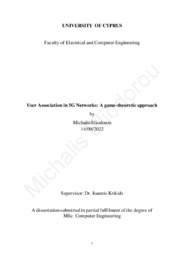| dc.contributor.advisor | Krikidis, Ioannis | en |
| dc.contributor.author | Eliodorou, Michalis | en |
| dc.coverage.spatial | Cyprus | en |
| dc.creator | Eliodorou, Michalis | en |
| dc.date.accessioned | 2023-02-10T05:26:49Z | |
| dc.date.available | 2023-02-10T05:26:49Z | |
| dc.date.issued | 2022-12 | |
| dc.identifier.uri | http://gnosis.library.ucy.ac.cy/handle/7/65455 | en |
| dc.description.abstract | In future fifth generation (5G) and beyond 5G wireless technologies, ultra-dense networks (UDNs) will be employed to serve a massive number of devices with mobile access. One of the major challenges in UDNs is user association, which is essential for dealing with intra- and inter-cell interference. In this thesis, two user association problems are investigated and solved via a game theoretical approach. Specifically, the first coalition game exploits the cooperation among the small base stations (SBSs) by utilizing both the zero-force (ZF) beamforming technique and the Non-Orthogonal Multiple Access (NOMA) scheme. A game theoretic algorithm is formulated, aiming to maximize the overall data-rate. Simulation results show that the proposed algorithm can significantly improve the total sum-rate, providing near-optimal solutions while keeping the complexity low. The second coalition algorithm investigates a user association problem for mobile edge computation (MEC) offloading in NOMA networks. NOMA can allow multiple users to access the MEC server to offload data simultaneously. However, resources are shared among the users which can potentially impact the required transmit power for offloading, thus increasing the total energy consumption. Aiming to minimize the overall energy consumption for all the users of the network, we formulate a problem where user association, optimal power allocation, data rate and offloaded data are jointly considered. Simulation results show that the proposed coalition game algorithms can successfully reach a final state with low complexity, where the overall energy consumption is significantly reduced. The effectiveness of coalitional games is shown in this work through the form of algorithms along with their ability to be utilised for resource allocation problems. | en |
| dc.language.iso | eng | en |
| dc.publisher | Πανεπιστήμιο Κύπρου, Πολυτεχνική Σχολή / University of Cyprus, Faculty of Engineering | |
| dc.rights | CC0 1.0 Universal | * |
| dc.rights | info:eu-repo/semantics/openAccess | en |
| dc.rights | Open Access | en |
| dc.rights.uri | http://creativecommons.org/publicdomain/zero/1.0/ | * |
| dc.title | User Association in 5G Networks: A game-theoretic approach | en |
| dc.title.alternative | Συσχέτιση χρηστών σε δίκτυα 5G: Μια προσέγγιση βάση της θεωρίας παιγνίων | el |
| dc.type | info:eu-repo/semantics/masterThesis | en |
| dc.contributor.committeemember | Krikidis, Ioannis | en |
| dc.contributor.committeemember | Theocharides, Theocharis | en |
| dc.contributor.committeemember | Charalambous, Themistoklis | en |
| dc.contributor.department | Τμήμα Ηλεκτρολόγων Μηχανικών και Μηχανικών Υπολογιστών / Department of Electrical and Computer Engineering | |
| dc.subject.uncontrolledterm | GAME THEORY | en |
| dc.subject.uncontrolledterm | COALITION GAMES | en |
| dc.subject.uncontrolledterm | RESOURCE ALLOCATION | en |
| dc.subject.uncontrolledterm | USER ASSOCIATION | en |
| dc.subject.uncontrolledterm | MOBILE EDGE COMPUTING | en |
| dc.subject.uncontrolledterm | NON-ORTHOGONAL MULTIPLE ACCESS | en |
| dc.subject.uncontrolledterm | ZERO-FORCE BEAMFORMING | en |
| dc.author.faculty | Πολυτεχνική Σχολή / Faculty of Engineering | |
| dc.author.department | Τμήμα Ηλεκτρολόγων Μηχανικών και Μηχανικών Υπολογιστών / Department of Electrical and Computer Engineering | |
| dc.type.uhtype | Master Thesis | en |
| dc.contributor.orcid | Krikidis, Ioannis [0000-0003-4036-1364] | |
| dc.gnosis.orcid | 0000-0003-4036-1364 | |


